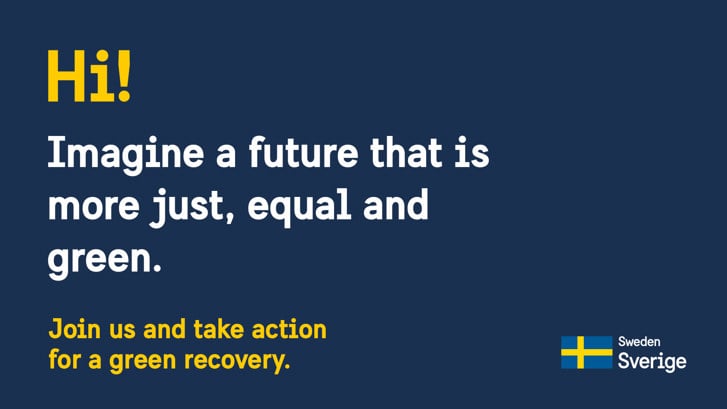Covid-19 and climate change are two unprecedented challenges for all of us. While we now rightly focus on containing the virus, addressing the immediate health crisis and limiting the economic damages, we also need to start tracking our way out of the crisis towards recovery. We need to ensure that the recovery is based on the vast opportunities that green transition offers.

Africa is home to a remarkable animal, plant, and marine biodiversity. The continent is rich intropical forests, wetlands, deserts, savannah and montane grasslands, providing critical ecosystem services and serving as buffers to climate change. For example, mangrove swamps protect coastal societies in Eastern Africa from cyclones and tsunamis, while serving as homes for various species and a source of income for the local people.
However, the region is experiencing a dramatic loss of biodiversity. Agricultural and other human expansion on land and in the sea, overexploitation of wildlife and spread of invasive alien species are some of the drivers for biodiversity loss, and so is climate changeand pollution. Scientists have warned that by 2100, climate change alone could cause the loss of over half of mammal and bird species and trigger a 10-30% decline in lake productivity.
The effects are already becoming apparent, and if we fail to address these interlinked crises, we will see more hunger, new pandemics, greater injustice and marginalization, more conflicts and forced migration. Conservation and sustainable use of biodiversity is acornerstone for development – loss of diversity poses risks to existing development gains and to further progress. And we know that climate change and loss of biodiversity is particularly affecting people living in rural areas who are often the poorest.
How do we address the ongoing disastrous loss of biodiversitywhile building better and more fair societies in the wake of the pandemic? We know that urgent action is required at global, continental, regional and local level, and we must work together. In order to deal with these challenges, the African Union recentlylaunched a new continental Green Recovery Action Plan for the period 2021-2027, that includes a pillar for biodiversity. Sweden is honoured to co-champion this important initiative. Through collaboration with African countries and partners we will bring this plan to life on the ground and showcase positive examples.
Nature-based solutions will be identified and implemented. Focus will be on biodiversity through work on sustainable land management, including forestry, and marine ecosystems.We can and must all ensure we put climate action and protection of biodiversity at the heart of national budgets and planning processes. This in turn will facilitate resource mobilisation for implementing the 2030 Agenda, Agenda 2063 as well as the Paris Agreement and the protection of biodiversity. Let’s use the urgency of climate action and biodiversity protection as a driver also for broader development gains. There is no contradiction between curbing fossil fuel emissions and achieving economic growth. Instead, we know that shifting to green, eco-friendly energy solutions creates employment and contributes to development, through increased trade and investments.
The African Union Commission is committed to working with its member States, Regional Economic Communities, partners and relevant stakeholders to drive Africa’s economic recovery from Covid-19 in a sustainable manner. The Commission aims to do this through the implementation of the Green Recovery Action Plan’s five pillars – Climate Finance, Renewable Energy, Nature Based Solution and Biodiversity; Resilient Agriculture and Green Resilient Cities to drive Africa’s economic recovery from Covid-19 in a sustainable manner. Sweden will do its part as one of the largest financial contributors to climate change and biodiversity related development aid. Ensuring climate change resilience is a key focus in our bilateral and regional development programmes across Africa. 2021 is the African Union’s year of arts, culture and heritage. When talking about culture and heritage, it includes not only the social behaviour and norms of a society, but also the society we want to hand over to the next generation. Loss of biodiversity and climate change are both driven by human economic activities and mutually reinforce each other. Neither will be successfully resolved unless both are tackled. And just as humans are responsible for this multiple crisis, we also have the power to decide on sustainable solutions to change this path. For this reason, a successful outcome of the UN climate conference COP26 in Glasgow is crucial. Equally important is to come together and adopt a biodiversity agreement, to save life on earth. This will be in focus at the second part of the UN biodiversity conference COP 15 scheduled to take place in Kunming, China in 2022. It is in our common interest to advance an agenda that ensures a green transition and fosters a sustainable development. This is the time to not only talk the talk but also walk the walk. The African Union and Sweden are committed to deliver on our commitments, and we urge others to step up efforts as we build back better and greener for the next generation.
Per Olsson Fridh, Minister for International Development Cooperation
Josefa Sacko, African Union Commissioner for Agriculture, Rural Development, Blue Economy and Sustainable Environment
Per Bolund, Minister for Environment and Climate, Deputy Prime Minister, Sweden